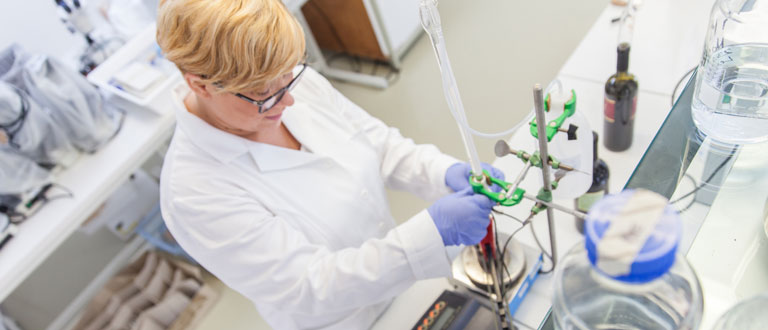How Professional Food Scientists Test Lipids, Fats and Oil

Understanding and Preventing Rancidity in Food Products
Rancidity, often the first sign of spoilage, occurs when lipids (fats and oils, but also waxes and certain vitamins) in food are exposed to air, light, moisture, or bacterial action. This significantly impacts a product's shelf life and consumer experience. While color and texture may remain unaffected, rancidity leads to undesirable tastes and odors, reducing product quality and marketability. Regular rancidity testing is crucial for maintaining product integrity and meeting consumer expectations.
Shelf Life Testing
Our knowledge and experience help your brand deliver the ideal consumer experience every time. Contact us to learn about our pragmatic solutions for shelf-life testing.
Contact UsThe Impact of Rancidity on Shelf Life
Rancidity, encompassing various types (oxidative, hydrolytic, etc.), is measured using several analytical markers (Hexanal, Peroxide Value (PV), Anisidine Value, enzyme assays, etc.). These markers help determine the extent of lipid oxidation and predict a product's shelf life. Accurate rancidity testing is essential for setting realistic expiration dates and ensuring product quality.
Choosing the Right Rancidity Test
Testing lipids, fats, and oils for rancidity isn't straightforward. The ideal scenario would be a single, universal test, but the reality is more complex. Factors such as fat characteristics, product type, fat content, ingredients, and even packaging influence test results. Therefore, selecting the appropriate test is critical for accurate and reliable data.
Medallion Labs offers a range of testing options to ensure accurate results. The final choice depends on the specific product and its characteristics. Our goal is to provide actionable and reportable data to help you make informed decisions.
Our peroxide value testing can help you measure the state of oxidation in fats and oils.
Key Rancidity Tests Offered by Medallion Labs
We offer ten rancidity tests, but four are particularly relevant to our clients:
1. Peroxide Value (PV) Test
The PV test is the most common method for measuring lipid oxidation in fats and oils. The presence of peroxides indicates rancidity in unsaturated fats and oils. While it measures primary oxidation, it doesn't assess long-term stability.
Methodology: A fat or oil sample is dissolved, and excess potassium iodide is added. Peroxides oxidize the iodide, forming iodine, which is then titrated with sodium thiosulfate to calculate the PV.
Reporting: Milliequivalents of peroxide oxygen per kilogram (meq/kg) of fat.
Requirements: 100g sample (at least 0.5g extracted fat), 7-9 business days. Rush testing available.
Our free fatty acid testing can help you measure the degeneration of deep-fried foods.
2. Free Fatty Acids (FFA) Test
This test measures the degeneration of oils, particularly in deep-fried foods, where high temperatures, oxygen, and moisture cause hydrolysis, producing FFAs. FFAs contribute to undesirable color, off-flavors, and a lower smoke point.
Methodology: Fat is extracted into an organic solvent and titrated with sodium hydroxide. Rancidity is expressed as a percentage of oleic acid (or lauric/palmitic acid for coconut/palm oils).
Reporting: Percentage of FFA as oleic acid (or lauric/palmitic acid).
Requirements:100g sample (at least 0.5g extracted fat), 7-9 business days. Rush testing available.
Our anisidine value testing can help you understand the oxidation history of vegetable and animal oils that are unsaturated.
3. Anisidine Value (in Oils) Test
This test measures aldehyde levels in unsaturated vegetable and animal oils, assessing secondary oxidation and providing insights into the oxidation history.
Methodology: Oil samples are diluted in isooctane, reacted with anisidine reagent, and the resulting colored complexes are measured spectrophotometrically at 350nm.
Reporting: Anisidine Value
Requirements: 5g sample (highly pigmented oils are not accepted), 7-9 business days.
4. Hexanal Test
Hexanal, formed during the oxidation of omega-6 fatty acids (common in food), affects aroma and flavor. This test measures the oxidation level of omega-6-rich products.
Methodology: A sample is mixed with water containing an internal standard, heated, and headspace gas is analyzed by gas chromatography.
Reporting: Parts per million (ppm)
Requirements: 20g sample, 7-9 business days. Rush testing available.
Our hexanal testing measures the oxidation of omega-6 fatty acid rich food products.
Accurate Rancidity Testing: Essential for Shelf-Life Determination
Rancidity testing is crucial for establishing accurate and reliable expiration dates, especially for food products high in lipids. By utilizing the appropriate testing methods, you can avoid wasting time, money, and samples. Medallion Labs provides a comprehensive suite of tests to ensure accurate and standardized results.
Contact Medallion Labs today! Call 1-800-245-5615 or visit our website to discuss your lipid, fat, and oil testing needs.
Let's Get to Work!
Submit your order online and ship your samples today. If you have questions, we are always here to help.
Medallion Labs+
A food testing program designed with mid-market and enterprise food and ingredient manufacturers in mind.